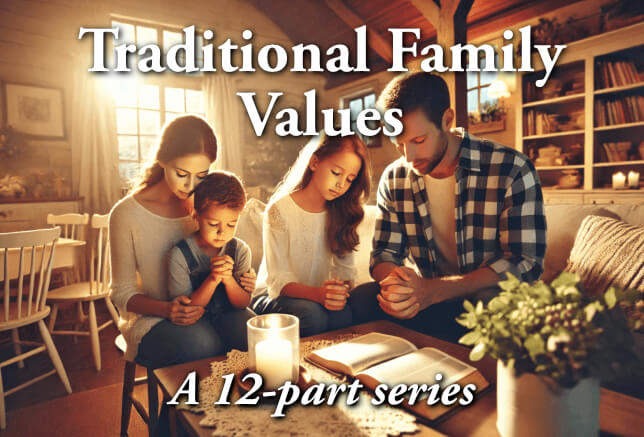Playback speed:
Call to Action: Returning to Godly Family Values
Introduction
As we conclude our 12-part series on traditional family values, it is vital to reflect on the importance of returning to Godly family values to strengthen society. Each of the previous eleven parts has highlighted significant challenges facing the modern family and society. By understanding and addressing these issues through a biblical lens, we can work towards restoring the family unit as God intended. This final post will emphasize the need for a collective return to traditional family values and underscore the importance of community efforts in this endeavor.
The Foundation of Traditional Family Values
In Part 1, we discussed the foundational principles of traditional family values, which are essential for a healthy and loving environment. The decline of traditional family households has been linked to various social issues, including increased crime rates and family instability. The importance of returning to these values cannot be overstated, as they provide the bedrock for strong, healthy societies.
Psalm 127:1 states, “Except the Lord build the house, they labour in vain that build it: except the Lord keep the city, the watchman waketh but in vain.” This verse emphasizes the necessity of building our families and communities on a foundation rooted in God’s principles. Without this foundation, our efforts to create stable and loving environments will ultimately be in vain.
The Biblical Foundation of Marriage
Part 2 explored the biblical foundation of marriage, tracing its origins and significance from the creation account in Genesis. Marriage, as ordained by God, is a holy institution designed to unite a man and a woman in a lifelong covenant. This foundation is critical for understanding the sanctity of marriage and the importance of commitment.
Genesis 2:24 declares, “Therefore shall a man leave his father and his mother, and shall cleave unto his wife: and they shall be one flesh.” This verse underscores the divine nature of marriage and its role in God’s plan for humanity. By returning to this biblical foundation, we can restore the sanctity and stability of marriage in our society.
Marriage as Essential to Human Happiness
In Part 3, we examined how marriage contributes to human happiness by fulfilling the need for companionship, intimacy, and mutual support. A strong marital bond provides a stable environment for personal and spiritual growth, fostering a sense of belonging and purpose.
Proverbs 18:22 states, “Whoso findeth a wife findeth a good thing, and obtaineth favour of the Lord.” This verse highlights the blessings that come from a godly marriage. By promoting and supporting healthy marriages, we can enhance the overall well-being and happiness of individuals and families.
The Universal Institution of Marriage
Part 4 discussed the universal nature of marriage across cultures and history. Marriage has been recognized as a vital social contract that promotes stability and continuity. Despite cultural differences, the core purpose of marriage remains consistent: to unite individuals in a committed, lifelong partnership.
Hebrews 13:4 emphasizes the honor and sanctity of marriage: “Marriage is honourable in all, and the bed undefiled: but whoremongers and adulterers God will judge.” This verse underscores the importance of maintaining the purity and integrity of marriage. By upholding the universal principles of marriage, we can create a more stable and cohesive society.
The Role of Parents in a Traditional Family
In Part 5, we explored the critical role of parents in a traditional family. Parents are the primary role models for their children, and their behavior, values, and teachings significantly shape their offspring’s development. The presence of both a father and a mother provides a balanced environment that fosters emotional, social, and spiritual growth.
Proverbs 22:6 advises, “Train up a child in the way he should go: and when he is old, he will not depart from it.” This verse highlights the long-term impact of proper upbringing. By returning to traditional family values, parents can provide a stable and nurturing environment that supports their children’s development.
The Biblical Perspective on Divorce
Part 6 addressed the biblical perspective on divorce, emphasizing the sanctity and seriousness of marriage as a lifelong covenant. While there are permissible reasons for divorce, such as sexual immorality and abandonment by an unbelieving spouse, the overarching message is one of commitment, reconciliation, and healing.
Malachi 2:16 states, “For the Lord, the God of Israel, saith that he hateth putting away: for one covereth violence with his garment, saith the Lord of hosts: therefore take heed to your spirit, that ye deal not treacherously.” This verse underscores God’s strong disapproval of divorce. By promoting the sanctity of marriage and encouraging reconciliation, we can strengthen the institution of marriage and reduce the prevalence of divorce.
The Covenant of Marriage and Overcoming Challenges
In Part 7, we delved into the concept of marriage as a covenant and how to overcome challenges within marriage. Understanding marriage as a covenant helps us appreciate the depth of commitment required and the importance of perseverance and counseling.
Galatians 6:2 teaches, “Bear ye one another’s burdens, and so fulfil the law of Christ.” This verse highlights the importance of mutual support and burden-bearing within a marriage. By fostering a sense of commitment and providing support for couples facing challenges, we can strengthen marriages and promote long-term stability.
The Issue of Cohabitation
Part 8 addressed the issue of cohabitation, emphasizing the importance of sexual purity and commitment within marriage. Cohabitation often lacks the same level of commitment as marriage and can lead to increased temptation and compromise.
1 Corinthians 6:18 instructs, “Flee fornication. Every sin that a man doeth is without the body; but he that committeth fornication sinneth against his own body.” This verse highlights the importance of avoiding sexual immorality. By promoting biblical principles of marriage and sexual purity, we can create stronger, more stable relationships.
Perverted Partnerships and Their Impact on Society
In Part 9, we discussed the impact of perverted partnerships on society. Relationships that deviate from God’s design undermine the traditional family structure and lead to moral confusion and social instability.
Leviticus 18:22 states, “Thou shalt not lie with mankind, as with womankind: it is abomination.” This verse explicitly condemns homosexual relationships, affirming that such practices are against God’s natural order. By upholding biblical standards for relationships, we can promote moral clarity and social stability.
The Impact of Non-Traditional Family Structures on Children
Part 10 highlighted the impact of non-traditional family structures on children. Research shows that children raised in stable, two-parent households fare better in various aspects of life compared to those from non-traditional family backgrounds.
Ephesians 6:4 instructs, “And, ye fathers, provoke not your children to wrath: but bring them up in the nurture and admonition of the Lord.” This verse emphasizes the importance of providing a stable, loving home rooted in biblical principles. By supporting traditional family structures, we can ensure the healthy development of children.
The Decline of Traditional Family Values in America
In Part 11, we examined the decline of traditional family values in America. The decline of traditional family households has been linked to various social issues, including increased crime rates and family instability.
Isaiah 5:20 warns, “Woe unto them that call evil good, and good evil; that put darkness for light, and light for darkness; that put bitter for sweet, and sweet for bitter!” This verse highlights the dangers of moral relativism and the rejection of absolute truth. By reaffirming traditional family values, we can work towards restoring moral clarity and social stability.
Strengthening Society through Godly Institutions
To address the challenges highlighted in each part of this series, we must strengthen society through godly institutions. This involves building our families and communities on a foundation rooted in God’s principles.
Psalm 127:1 states, “Except the Lord build the house, they labour in vain that build it: except the Lord keep the city, the watchman waketh but in vain.” This verse emphasizes the necessity of relying on God’s guidance and wisdom in our efforts to create stable and loving environments.
2 Chronicles 7:14 underscores the need for repentance and a return to God’s ways: “If my people, which are called by my name, shall humble themselves, and pray, and seek my face, and turn from their wicked ways; then will I hear from heaven, and will forgive their sin, and will heal their land.” By returning to biblical family values, we can experience healing and restoration in our society.
Encouraging a Return to Traditional Family Values
Encouraging a return to traditional family values involves both individual and collective efforts. On an individual level, we must prioritize family commitments, teach biblical principles to our children, and model godly behavior in our own lives.
On a community level, the Church plays a vital role in supporting families and providing resources for parents. Through teaching, mentoring, and community programs, the Church can help reinforce the importance of traditional family values and offer guidance to those struggling with non-traditional family dynamics.
Conclusion
The decline of traditional family values has significant consequences for individuals and society as a whole. By understanding the causes and consequences of this decline, we can better appreciate the urgent need to reaffirm and uphold biblical principles in our families and communities. As we conclude this series, let us commit to promoting and living out these values, working towards a society that reflects God’s design for the family.
Call to Action
As we reflect on the decline of traditional family values in America, let us commit to upholding and promoting biblical principles in our own lives and communities. By teaching and modeling God’s design for the family, we can help create a more stable and loving society. Let us pray for wisdom, strength, and guidance as we uphold the sanctity of the family and support one another in our journey of faith. Let us work together to restore the foundation of traditional family values and ensure a better future for the next generation.
- Part 1: Introduction: The Bedrock of Civilization (link)
- Part 2: The Biblical Foundation of Marriage (link)
- Part 3: Marriage as Essential to Human Happiness (link)
- Part 4: The Universal Institution of Marriage (link)
- Part 5: The Role of Parents in a Traditional Family (link)
- Part 6: The Biblical Perspective on Divorce (link)
- Part 7: The Covenant of Marriage and Overcoming Challenges (link)
- Part 8: The Issue of Cohabitation (link)
- Part 9: Perverted Partnerships and Their Impact on Society (link)
- Part 10: The Impact of Non-Traditional Family Structures on Children (link)
- Part 11: The Decline of Traditional Family Values in America (link)
- Part 12: Conclusion and Call to Action: Returning to Godly Family Values (link)





